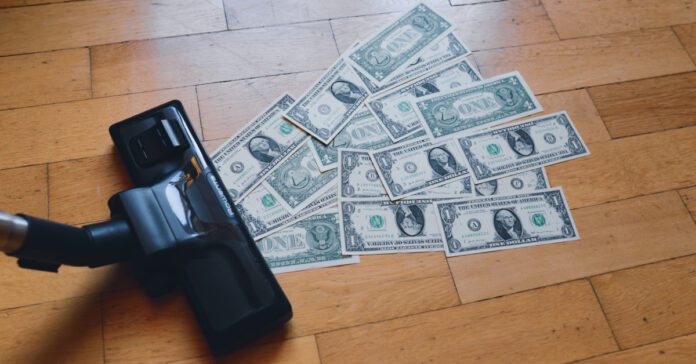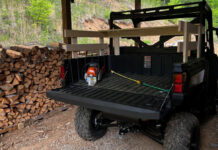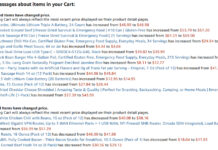In yesterday’s post, I asked:
What if gasoline hits $10 or $12 a gallon next year, food costs double, and inflation hits 25 percent? How long can you last then? How long can you heat your house if energy costs continue to skyrocket? Are you ready to cut back on buying almost everything and doing almost nothing that costs money? Do you have a side gig if you lose your primary job due to a recession, or worse, a depression?
Are you prepared if China invades Taiwan?… How much prescription medication do you have on hand in case supplies dry up?
Let’s look at how I would answer these questions given my present state of preparedness. While your preps and living situation may differ from mine, I hope you can still learn from these examples, even if all you take from it is an approach or attitude. I’ll break the questions down one-by-one.
What if gasoline hits $10 or $12 a gallon next year?
We would cut waaay back on driving. This would affect my wife the most because she is more social than I. For example, going to yoga twice a week would have to stop. Luckily, she has two friends who live within three miles, so she could still visit them with minimal gas consumption.
I expect I would drive somewhere only once every two weeks. We would also combine all our errands into one trip, which would include grocery shopping. We might also carpool with our closest neighbor. There would be no running out to get something. It would go on a list and we would get it when we go out. We would carefully plan each trip for minimal gas consumption.
I would also cut back on lawn mowing and weed whacking, even though the latter uses little gas.
We’d have to see our kids less since they live hours away by car.
What if Food Costs Double?
We would do several things:
- Bake more food at home. We already make many meals from scratch, but we only bake bread occasionally. We would use honey instead of sugar as much as possible.
- Eat more leftovers and waste less food. We already feed old or spoiled food to the chickens, but we could do more to eat leftovers and consume this food ourselves. For example, we would not cook more food until the leftovers were gone or frozen.
- Grow more food ourselves. We could provide most of our fresh greens by growing micro greens and sprouts. We could also expand the garden by adding another bed or two.
- Eat some of the oldest food in our storage pantry and our long-term supplies. Many of our MRE entrees are getting near the end of their storage life, so we could eat them a couple of times a week. I also have an 8-pack of Spam with a “best by” date in 2020 and some sardines that are older than that. They would go first.
- We would eat less store-bought meat. For example, I’d give up having meat at breakfast and we’d have less at other meals. Having meat as an entrée would be rare unless I killed something.
- Use more potatoes, pasta, rice and other inexpensive but filling starches. I expect we would eat split peas, lentils, and beans far more often than we do now.
- Give up sweets and cut back on junk food. We don’t eat all that much, but if prices doubled, even dollar store cookies might be off the list.
- We would make better use of wild foods that we can harvest at no cost. This would include preserving them with dehydration or canning. I expect we would tire of apple sauce, but it is better than going hungry.
- Barter our home-grown products, mostly eggs and honey, but perhaps some vegetables, to obtain foods we do not grow ourselves.
- I would put a greater emphasis on hunting. I would also consider starting a small trap line.
- We might reactivate my plans to raise rabbits.
What Would you do if Inflation Hits 25 Percent?
We would make do with what we have and buy fewer things. For example, we’d wear what we have until we literally wore it out and then we would repair it, if possible. We’d try to fix things that broke and we’d buy more items at the thrift store and second-hand-shop.
If we were to do an honest assessment, much of what we buy is what we want, like, or enjoy. Many items we spend money on are not necessities. If inflation continues to drive up prices, we will whittle what we buy down to necessities and then to the bare necessities.
There are small things we can do that today would save nickels, but as inflation rises they could save quarters, and quarters will add up. For example, we could save on our electricity bill by unplugging the electronic picture frame, the digital weather center, and other in-home electronics that use a trickle of electricity to shine an LED even when they are off. Most of our larger electronics, like the TVs, are on uninterruptible power supplies to protect us from power outages and surges. We could turn them off when not in use and save the electricity.
We could stop using the electric dryer, which is a huge consumer of electricity, and hang clothes on a clothesline to dry. I have the line and clothespins in my prepper stash for just such an occasion. If we have less fresh food, we could also stop using the second refrigerator. At some point, we might not even need the freezer.
How long can you heat your house if energy costs continue to skyrocket?
This is an easy question for us as we heat with firewood. We already have five cords of wood on hand, which should be enough to heat our house in the coming winter. I even have a large amount of kindling split and stored. Because home heating oil and propane are so expensive, I expect many people will turn to burning wood this winter and there will be a shortage of firewood. I plan to buy more firewood this summer, while it is still available, and will continue to cut some of my own as well. We want to be over-stocked and have a surplus of dried wood on hand regardless of what happens in the market.
Right now, my firewood costs have not risen, but I have noticed I am getting less oak and more ash and maple. I don’t know if this is my firewood providers attempt to save money or just what trees he is getting in. It is all hard wood and it all burns, but oak provides more BTUs per cord.
Are you ready to cut back on buying almost everything and doing almost nothing that costs money?
Yes. We can trim more costs and do fewer activities that cost money. One advantage of living in a remote mountain location is there’s not all that much to do. Many activities, like fishing and hiking, are free or very low cost.
I am already allowing my chickens more supervised free-ranging time to reduce the amount of commercial food they consume.
Do you have a side gig if you lose your primary job due to a recession, or worse, a depression?
Neither my wife nor I have a side gig, but we make a few bucks selling honey and eggs. That should increase late summer or fall as we expect a larger honey harvest this year.
Are you Prepared if China invades Taiwan?
I don’t think anyone is truly prepared for the massive disruption that such a war would cause to the economy and our supply chain. That said, we are about as prepared as we can be given our financial resources.
How much prescription medication do you have on hand in case supplies dry up?
The good news is that neither of us takes medication that we cannot live without. Despite this, I have a six month supply and my wife has anywhere from 30 days to four months. Some items, like inhalers, tend to expire before they get used up, so we have extras of these on hand. We also have some fish antibiotics. You know, in case our fish get sick.
The Biggest Challenges
Outside of food and fuel, I think the biggest challenge during a period of high inflation and a tight supply chain would be repairing things that break. This could be your car, an appliance, or a tool. Not only will the cost to make repairs soar, but parts will be on back order for months.
Medical care will probably be the second biggest challenge. While standard well-care should continue to be available, I expect any kind of treatment that requires special medicines, special diagnostic tools, or any kind of device will have tremendous wait times, if they are available at all. We’re already seeing a shortage of dye for radiography. That could just be the beginning.
Inflation is an old Enemy
The United States has enjoyed four decades of low inflation, so we all got used to it. But those years were more of an anomaly that you might think. The fiat dollar has lost value for more than 100 years, sometimes slowly, sometimes rapidly. You need to adapt to this new paradigm because we may have to live with higher inflation for years.
There is a long history of inflation, dating back centuries to when Roman emperors would dilute the amount of gold or silver in metal coins with base metals or make the coins slightly smaller. That’s when they “coined” the phrase “Bad money drives out good.” People would hoard the old coins and spend the new ones, knowing they had a lower value. This also happened again in Europe. Then it happened here in the mid-1960s when silver-clad quarters and dimes replaced the 90 percent silver coins the U.S. issued before 1965. It made the pre-65 coins scarce. Today, it will cost you around $23 to get a dollar’s worth of those old silver coins. That’s an example of how much inflation here’s been since the mid 1960s.
Learn to Live with Inflation
When you live with inflation, you want to spend your fiat currency to buy things of lasting value. Savings becomes futile unless you can get an interest rate close to the rate of inflation. I don’t mean the government’s official CPI rate, which is artificially low; I mean the true rate, which is closer to 15 percent.
The reason owning a house is considered a good investment is because it grows in value. Why does it grow in value? Largely because of inflation. If you can sell your used car for close to what you paid for it new, that’s also inflation. If you can sell the 9mm bullets you stashed away in your armory for more than you paid for them ten years ago, that’s another example of inflation.
From silver coins to your home to your bullets, you can see that hard goods are worth more than cash. When inflation strikes, cash is no longer king. Hard goods are. If you own assets that can produce cash, like a rental property, that’s even better.
If you have to save up for something, do it as quickly as you can.
Applying this Lesson to Life
When you can see the price of gasoline rise daily, you want to fill your car with gas frequently. Why? Because if you wait, it will cost more tomorrow and even more next week.
You should treat your groceries the same way. Go shopping as soon as you get paid. Fill your pantry and your freezer. If you can buy ground meat today for $4.49 a pound, do it, knowing that it will be $4.89 next time. Just manage the process so you don’t let food spoil, get freezer burn, or go stale.
Likewise, when something is on sale, snap it up. Let’s say you come across a sale on a 10 pound bag of sugar for $1 off, but you don’t need sugar yet. Buy it anyway. It doesn’t go bad and if you don’t use it, you can trade it for something you want. You also cannot afford to be brand loyal during times of high inflation. If you usually buy Oscar Mayer hot dogs, but Nathan’s are 60 cents less, buy the Nathan’s. Wait for sales and stock up. If you drink beer and know beer goes on sale before Independence Day, then buy enough beer to last you to the next sale, which may be Labor Day or the start of football season.
Adapt
People in Argentina have lived with on-again, off-again inflation for decades. Research how they have adapted and incorporate the same techniques into your life. Here is a recent article on their tactics to tackle inflation.
Inflation may make you angry, frustrated, or worried, but from a prepper standpoint, it’s preferable to a nuclear war, an EMP strike, or a comet that hits earth and kills billions of people. Yes, it’s no fun, but it should not be the end of the world. Even the Great Depression ended.







